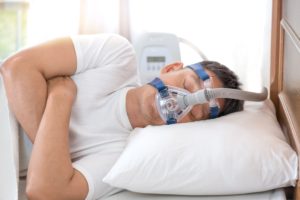 Obstructive sleep apnea and excessive daytime sleepiness increases cardiovascular disease risk in the elderly. To achieve their findings, researchers looked at patients with moderate to severe obstructive sleep apnea (OSA) and categorized patients into one of four categories: disturbed sleep, minimally symptomatic, moderately sleepy, and excessively sleepy.
Obstructive sleep apnea and excessive daytime sleepiness increases cardiovascular disease risk in the elderly. To achieve their findings, researchers looked at patients with moderate to severe obstructive sleep apnea (OSA) and categorized patients into one of four categories: disturbed sleep, minimally symptomatic, moderately sleepy, and excessively sleepy.
There has been previous research which linked OSA with cardiovascular disease, but to better understand the association, the researchers looked more closely at the symptoms of OSA.
Advertisement
Lead author Dr. Diego R. Mazzotti explained, “Multiple studies from our group have shown that patients with moderate to severe OSA throughout the world can be categorized into specific subtypes based on their reported symptoms. However, until now, it was unclear whether these subtypes had different clinical consequences, especially in regard to future cardiovascular risk.”
The recent study looked at data collected from 1,207 adults that participated in the Sleep Heart Health Study. Patients were over the age of 40 and were followed for nearly 12 years. Patients had moderate to severe OSA, which was defined as having at least 15 episodes per hour during sleep. Participants reported symptoms such as snoring, difficulties falling asleep, fatigue, drowsiness driving, and daytime sleepiness in order to determine each patients subtype.
The researchers found that patients who were categorized in the excessively sleepy subtype were:
- More than three times more likely to be diagnosed with heart failure
- Over twice as likely to experience a cardiovascular event during the follow-up period
- The only group to have higher rates of cardiovascular disease at enrolment
- More likely to experience a new or recurrent cardiovascular event during a follow-up period
The researchers suggest that a higher risk of cardiovascular disease in OSA is related to being in the excessively sleep subtype. The researchers wrote that excessive sleepiness could be a “surrogate marker of underlying cardiovascular risk pathways.”
Advertisement
Dr. Mazzotti added, “Even without further research, clinicians should recognize that patients with OSA who complain of feeling tired when they wake up and sleepy during the day and have a high score on the Epworth Sleepiness Scale are at greater risk for cardiovascular disease.”
The next steps from the researchers are to develop a tool to facilitate the accurate classification of patients with OSA. If doctors could properly put patients into a subtype, then they could recommend more specific treatments and prevention tips of cardiovascular disease.
Also read: 11 best essential oils for sleep apnea treatment
